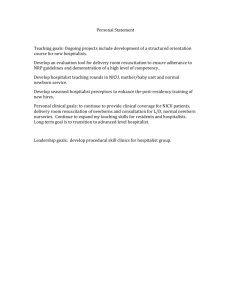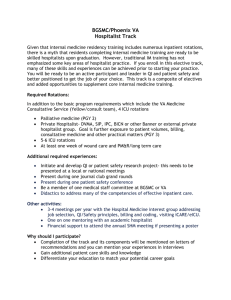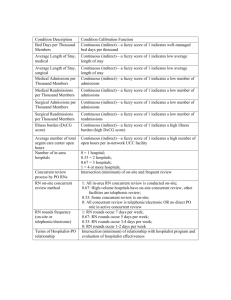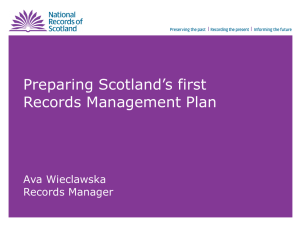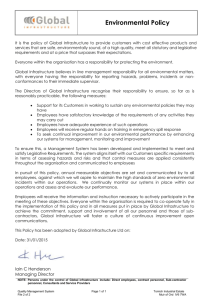Senior Hospitalist Postion Description
advertisement
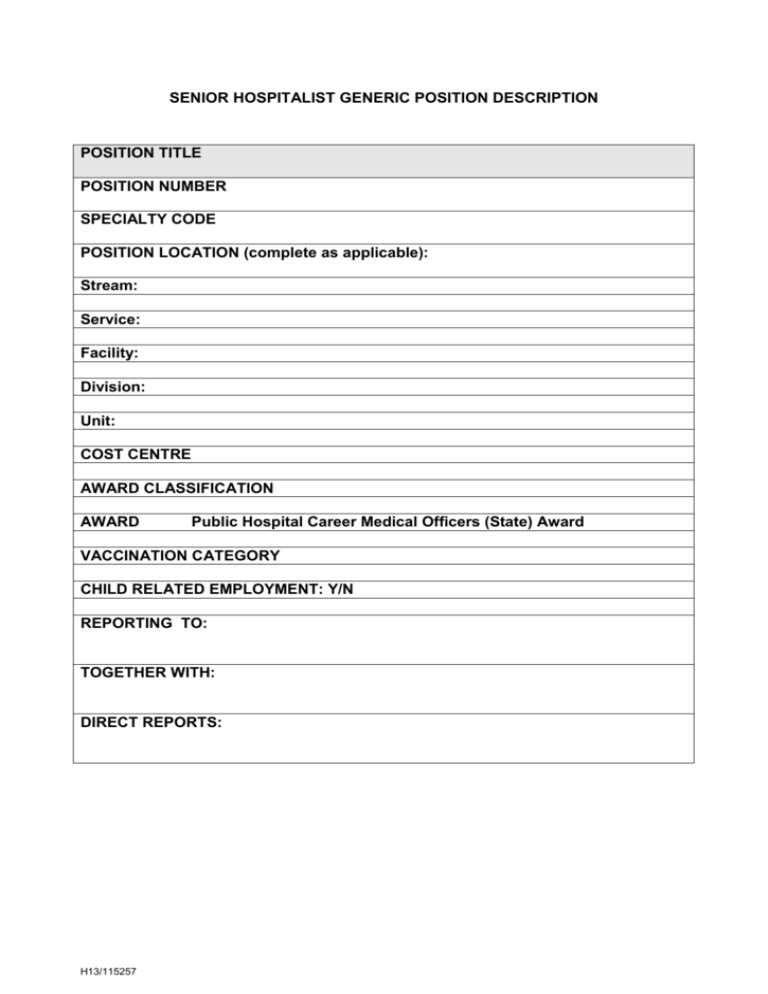
SENIOR HOSPITALIST GENERIC POSITION DESCRIPTION POSITION TITLE POSITION NUMBER SPECIALTY CODE POSITION LOCATION (complete as applicable): Stream: Service: Facility: Division: Unit: COST CENTRE AWARD CLASSIFICATION AWARD Public Hospital Career Medical Officers (State) Award VACCINATION CATEGORY CHILD RELATED EMPLOYMENT: Y/N REPORTING TO: TOGETHER WITH: DIRECT REPORTS: H13/115257 THE SENIOR HOSPITALIST The Senior Hospitalist has a medical and organisational leadership role in the provision of quality clinical services. The Senior Hospitalist is able to provide clinical expertise and advice, including after hours, and has a special focus on promoting safe, effective and efficient patient care which is coordinated across a range of disciplines and settings. MAIN PURPOSE OF SENIOR HOSPITALIST POSITION To provide experienced clinical management of patients within and across a range of settings, including Emergency Department, Medical Assessment Unit, peri-operative services, in-patient and community care; To lead the development of quality and safety improvement processes and To provide supervision and education for staff within <insert, the hospital, in defined areas or discipline>. POSITION REQUIREMENTS This Position Description is a GENERIC document, for adaptation to different hospitals and settings, according to the specific requirements of the job to be filled. ACCOUNTABILITIES 1. Clinical Care The Senior Hospitalist does not have admitting rights, however can be expected to exercise a high degree of professional independence and make decisions about choice of the admitting team, e.g. for patients in an Emergency Department and may be senior doctor in charge of a small or medium-sized hospital after hours. The Senior Hospitalist should be responsible for: Providing initial assessment and care of patients according to the clinical area of work Providing clinical care consistent with the care plan of the admitting specialist and support the coordinated and effective management of patients Providing clinical management across clinical streams and specialists’ plans. Performing patient assessment and clinical risk assessment particularly in emergency or deteriorating situations, and for patients with co-morbidities and elderly patients Communicating care plans to patients and carers Acting as team leader in a medical emergency Giving management advice and assistance for junior doctors and others Reviewing and continuing management of the deteriorating patient Leading medical involvement in end of life care and following advance care directives Ensuring a high standard of clinical record documentation To provide leadership in effective management of hospital patients, the Senior Hospitalist will: Develop and maintain clinical skills at the highest level in areas including therapeutics and procedural management Provide continuity by being consistently based in the same facility Play a leading role in the review, development and implementation of hospital clinical guidelines and protocols and systemic improvements. 2. Quality and Safety Provide leadership and direction to evaluate, develop and drive systems of clinical quality and safety across the hospital/stream. 2 Provide leadership for, and contribute to, initiatives that result in improved patient safety and quality of care including: Coordination of care across the whole hospital Medication Review Falls Prevention, Infection Control and Wound Management Medical Records Audit, including review of discharge summaries and death certification Adverse and near-miss events monitoring Morbidity and Mortality Review Complaints Management, Error Review and RCAs Management of system improvements through conducting and supporting research studies and implementing research findings Establish, review and maintain effective and safe handover procedures. Actively support a “just” culture that encourages swift recognition and correction of errors and problems and creates a positive environment for changes to be made. 3. Continuity of Care Lead, sponsor and design processes to improve the continuity of clinical care, coordination of services, patient handover, and discharge planning during and after hospitalisation. Contribute to effective clinical management, transition to community care and discharge planning by: Leading medical participation in multidisciplinary management and discharge meetings Using discharge risk screenings Facilitating safe early discharge and referral to community providers Maintaining links and discussing follow up care plans with GPs, patients and family, carers, outpatient services, allied health and community service providers Acting as a point of contact for GPs and community clinicians regarding admission and discharge management Ensuring patients and their families contribute to care planning and are informed, prepared, and effectively resourced to safely and confidently manage the transition back to the community. Provide leadership in effective handover procedures for hospital patients by: Establishing processes for effective handover between shifts and between teams Monitoring use and function of handover systems 4. Co-ordination of Care Provide leadership in the effective communication and co-ordination of care of hospital patients, by establishing and facilitating communication and coordination between specialty, administrative and community services groups. Support multidisciplinary team care by contributing to team building, mentoring and training. Support members of care teams by providing expert clinical advice and acting as a clinical leader, and encouraging co-ordination of care of hospital patients through effective and timely communication with: the patient, carers and relatives the specialist team pre and post acute care providers including GPs and community service providers aged-care teams, hostels and nursing homes. 3 5. Teaching, Research and Clinical Supervision The Senior Hospitalist will provide leadership in the orientation, teaching, mentoring and clinical supervision of medical and other staff by: Contributing to the planning, provision and evaluation of orientation, teaching and supervision programs for clinical staff. Supervising junior medical officers Teaching hospital skills and providing ”on the job” training Contributing to the delivery of education and training programs such as the Clinical Education and Training Institute (CETI) Hospital Skills Program and Masters Programs through provision of teaching and assessment Identifying key training gaps related to the care of hospital patients for junior medical staff and helping them to prioritise gaining of competencies. Organising medical and procedural teaching in the hospital Supporting junior staff in dealing with difficult patients or challenging situations Being an accessible senior colleague for doctors in difficulty. The Senior Hospitalist will lead and support research programs and contribute to an environment which encourages research projects and helps to implement improvements from research-based evidence pursue their own continuing professional development 6. Performance Monitoring Participate in an annual performance review. Develop and implement a personal professional development plan which is reviewed and updated in the annual performance appraisal. Demonstrate that quality assurance, quality improvement and risk management obligations are met. Participate in the development and assessment of key performance indicators that provide outcome measures. 7. Administrative and other Matters Maintain a standard of personal and professional conduct that promotes the values of the (insert Public Health Organisation) and ensures the confidence and co-operation of colleagues and patients alike. Contribute to a positive workplace culture and work environment. Initiate, attend and participate in designated Public Health Organisation meetings and activities such as counter disaster preparation Participate as required in strategic planning for clinical service provision in the (insert Public Health Organisation ) Notify the Public Health Organisation as soon as possible of any event likely to give rise to a medico-legal claim or complaint against the (insert Public Health Organisation) or its staff, or adverse publicity for the Public Health Organisation. Provide responses as required to internal hospital enquiries relating to the carrying out of these duties, patient complaints, Health Care Complaints Commission matters, and medicolegal requests. Lead or participate in clinical, research and organisational committees as determined from time to time by the Public Health Organisation. Assist in appropriate administrative and managerial duties 4 CHALLENGES / PROBLEM SOLVING Major challenges for the Senior Hospitalist include: Exercising a high degree of professional independence, especially after hours, and providing a leading role in assessment, management and ongoing patient care in accordance with specialists’ management plans in complex clinical environments and enabling safe transition to community care. Working collaboratively with other members of the multidisciplinary team to ensure high standards of patient care and improved continuity of care Fulfilling a role in teaching and supervision as well as providing clinical service within the limitations of a busy public health service, Understanding the constraints of the health system and prioritising within these constraints. Promoting a caring and supportive environment for colleagues and staff, enabling people to do their best, and also contributing to effective management of stress and conflict in the workplace. Implementing and embedding quality and safety improvements in patient care. Recognising circumstances when referral to and advice from other colleagues is appropriate DECISION MAKING Clinical decisions associated with the management and treatment of the patients in (insert Public Health Organisation) Service are to be made in accordance with organisational policies, procedures and guidelines, and specific guidelines issued by the Department of Health and promulgated by (insert Public Health Organisation name). POSITION DIMENSIONS AND DELEGATIONS Staffing Budget Financial Delegation KEY INTERNAL AND EXTERNAL RELATIONSHIPS The position holder will be required to liaise, establish and maintain effective relationships with, a number of key people and groups including: Internal Senior and Junior Medical Staff; Other clinicians on the team including nursing, & allied health staff; Medical administration. Mentor or senior specialist supervisor Public Health Organisation Executive and management team Clerical and support staff Consultants within the Public Health Organisation External Patients and their families. Patients’ general practitioners and other external health care professionals and providers. 5 SELECTION CRITERIA 1. Qualified medical practitioner registered in Australia who: a. holds the Master of Clinical Medicine (Leadership & Management) qualification from the University of Newcastle and has a minimum of five years postgraduate clinical experience; or b. holds equivalent qualifications and/or skills and has a minimum of seven years postgraduate experience. 2. High level skills and involvement in clinical care; supervision; mentoring; and teaching; with the ability to exercise a high degree of professional independence. 3. Demonstrated ability to develop and embed improvements in clinical care; patient flow and care coordination; patient safety; and risk management processes. 4. Demonstrated high level leadership skills with the proven ability to lead teams to achieve positive change. 5. High level communication and interpersonal skills for working both within health care organisations and the outside community. 6. Participation in continuing professional development. 7. Demonstrated commitment to the broader service objectives of the NSW public health system, including the effective use of resources, and participation in activities beyond direct patient care. 6
